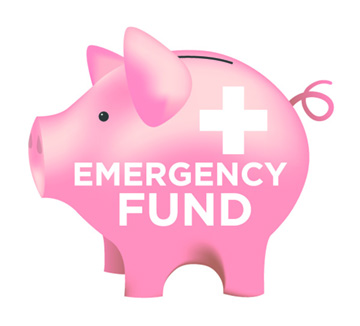
You never know what life is going to throw at you. Which is why it’s so important to build an emergency fund. These funds can be used for so many things – from unexpected medical expenses to the emergency replacement of an important home appliance. And they’re particularly important should you find yourself unemployed for any length of time. It can be very comforting to know that you’ve got your mortgage and bills covered when you’re looking for a job. But how do you build an emergency fund? Here’s what you need to know to get started.
How much should you save?
The amount you save will vary from person to person depending on your unique situation. When you’re building your emergency fund, you should aim to save anywhere from three to six month’s worth of expenses. But even just having a few hundred dollars stashed away can be a good start.
Where should I save the money?
Although it can be tempting to simply save the money in your normal checking or savings account, that can prove detrimental. It will be too easy to spend that money on things that aren’t an emergency. While you need to have quick access to the money, you should save it in a separate account. Look for savings accounts that earn interest so you can make more money on the cash you save.
How can I save the money?
The most challenging part of building an emergency fund is figuring out where the money is going to come from. Here are some ideas that can help you start saving money right away:
- Reduce expenses – Look through your monthly bills and find ways that you can cut your current expenses. Consider ending subscriptions for services you don’t use often. Turn the thermostat down a couple of degrees. Take those savings and deposit them in your emergency fund.
- Don’t spend your tax refund – Tax time is here. If you’re expecting a tax refund, then resist the urge to splurge. Instead, put that money in your emergency fund for when you really need it.
- Don’t spend cash gifts – It’s not unusual to receive cash gifts on special occasions, such as birthdays and anniversaries. Instead of spending that money on dinner out, put it in your emergency fund.
- Treat it like a normal bill – Determine how much money you’d like to set aside each month. Then treat that amount as though it is any other monthly bill you pay. Deposit it directly into your savings account and watch your fund grow.
- Sell something – We all have more belongings than we actually use. If you have anything of value that you can part with, consider selling it. You can make some serious cash when you sell items on eBay or other online marketplaces. Not only will you be contributing to your emergency fund, but you’ll also be de-cluttering your house. It’s a win-win situation.
- Get another job – If you have a little extra time in your schedule, then consider picking up a second job, even temporarily. Sacrificing a little time right now can really help you down the line when you need it most.


